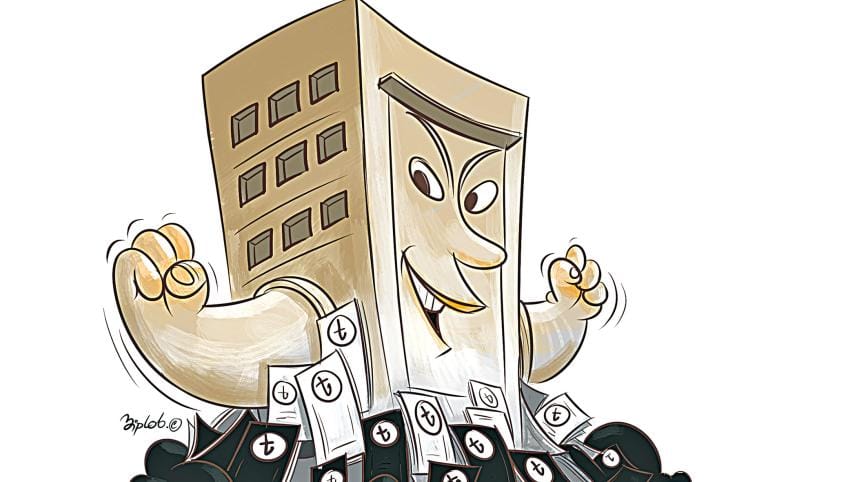Housing sector sees almost complete rebound

The real estate and housing industry passed a relatively good year thanks to policy support for purchasing property with untaxed income as well as cheap bank loans.
In the budget of the current fiscal year, the government allowed the use of untaxed income to purchase property, land and apartments in certain areas, without having to answer for the source.
Besides, banks provide home loans at very cheap interest rates of below 10 per cent as a secured investment for the lenders, according to industry players.
With this backdrop, the real estate industry enjoyed a quick rebound from the Covid-19 fallout.
"The relief is that the ongoing pandemic did not cause as much damage as we had expected for the country's housing sector as apartment sales witnessed a rising trend during July to December last year," said Alamgir Shamsul Alamin, president of the Real Estate and Housing Association of Bangladesh (REHAB).

The REHAB president could not give accurate figures on how many apartments were sold in the last six months but did say that the demand has increased.
However, during the early stage of the pandemic, when the government imposed a two-month nationwide lockdown between March 26 and May 30, the demand for apartments was nil as the people did not make such big investments in a time of crisis.
As a result, all the housing projects came to a halt, Alamin said.
Many customers were also unable to pay their instalments on time and so, due to the lack of funds, entrepreneurs in the housing sector became very worried about how they would pay their employees.
"I have never seen such an unusually difficult situation in my 35 years of experience," he said.
"Entrepreneurs are trying to turn things around again in a short period of time and the cooperation of the government has been added to it," he added.
The registration cost for an apartment has been reduced as well and alongside the availability of bank loans, people have been encouraged to buy flats.
Regarding the government decision to provide amnesty, he said people could now freely invest in the sector as they would be able to use untaxed income without facing harassment.
According to the REHAB president, around Tk 3,500 crore in untaxed income was invested in the sector over the last six months.
Regarding the sector's future, he said if any investor wants to keep their business running in the coming days, they have to maintain good communication with the banks.
"If banks do not lend at times of crisis, investment will collapse," he said.
The government provided a number of incentives to help address the corona crisis but due to negligence of the banks, the real traders were not able to take the opportunity.
"So, real estate traders have no chance to take up any new project in 2021. We need to pay more attention to the ongoing projects before they are completed because we are already one year behind."
"As we have seen in the corona crisis, good companies in the real estate sector have done more or less business, which is an important message for investors," Alamin said.
Reputation must also be gained by doing regular business, he added.
The REHAB chief went on to say that the government should expedite business initiatives.
He urged the Rajdhani Unnayan Kartipakkha not to create barriers in the housing sector by enacting any new law which will conflict with the government's ease of doing business initiative.
If the government provides a new incentive package though, then the housing sector should also be included because the sector contributes a lot to the country's economy and GDP, he said.
There are 35 lakh workers in the housing sector and 260 subdivisions are involved in housing.
Tanvir Ahmed, managing director of Sheltech Group, a leading developer in the country, said the economy is gradually gaining momentum while the low interest rate for home loan clients helped in increasing apartment sales.
"The clients prefer apartments that cost between Tk 1.2-2 crore and the demand increased from July, particularly after passing the budget by the parliament," he said.
Even the booking cancelation rate came down to nil during the last six months.
Basically, banks and non-banking financial institutions feel secured to provide home loans due to mortgage, which is lifting the real-estate sector, Ahmed added.
However, the demand for high-end apartments is yet to gain the same momentum.
Shehab Ahmed, general manager of Shanta Holdings, another leading developer, said sales for most developers have returned to pre-pandemic levels thanks to the government policy.
The government initiative regarding not asking about source of income for investment in the housing sector helped the housing sector rebound by end of 2020, he said.
Besides, the banks and non-banking financial institutions came forward to finance consumers and developers at the cheapest rates ever.
The lenders also felt secured to invest in this sector, which made it easy for the sector to recover, he added.
Kamal Mahmud, vice-president of REHAB and managing director of Skiros Builders, said the demand for mid-range apartments of 1,000 to 1,500 square feet increased.
According to him, less than 5 per cent of the clients are expatriates while the rest are Bangladeshi resident, proving that the government initiative to revive the housing sector was fruitful.
Mahmud believes that if the government continues to provide this scope, the real estate sector will do good this year and recover from the loses faced during early stage of the pandemic, when around 6,000 projects were halted.
"But now, almost all those apartments have been sold," he said, adding that there is now a scarcity of finished apartments for sale.




 For all latest news, follow The Daily Star's Google News channel.
For all latest news, follow The Daily Star's Google News channel.
Comments